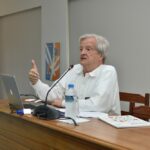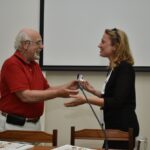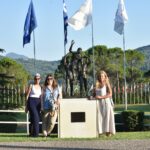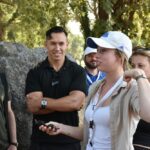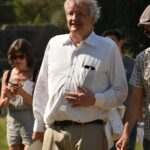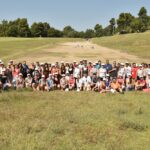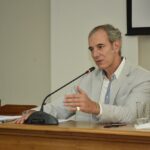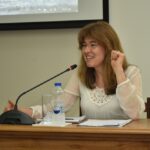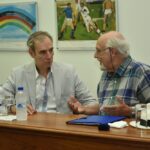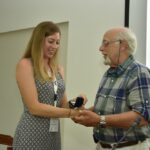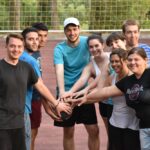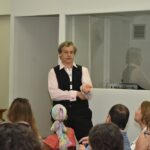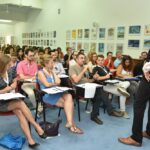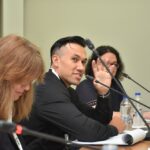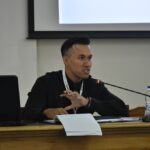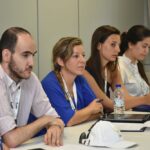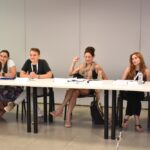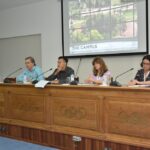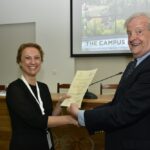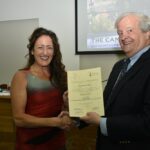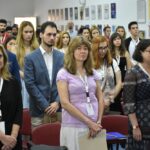The International Olympic Academy (IOA), in cooperation with Harvard University’s Center for Hellenic Studies (CHS DC and GR), organized the Fifth Annual International Symposium on “Sports, Society and Culture” in Ancient Olympia, on July 9-13, 2016. Like all previous years, the Symposium hosted scholars from around the world and brought together more than a hundred students and professors from Universities in Greece, America, Canada and for the first time this year, Cyprus.
Building on the experience and the material of the previous Symposiums, the specific topic of the 2016 Symposium was “To Bring Back Victory: Local and Global Aspects of Ancient Athletics and the Modern Olympics.” The 2016 Symposium was meant as a critical exploration of the notion of victory with a focus on local and global festivities and the homecoming of the athlete, aiming at fostering dialogue between ancient and modern perspectives.
The Symposium commenced with an address from Mr. Isidoros Kouvelos, President of the International Olympic Academy, Prof. Dionyssis Gangas, Director of the International Olympic Academy and Prof. Gregory Nagy, Director of the Center for Hellenic Studies and Francis Jones Professor of Classical Greek Literature and Professor of Comparative Literature at Harvard.
The sessions of the Symposium consisted of lectures* by:
- Gregory Nagy, on “The symbolism of a reference to a local athletic festival in the Alcestis of Euripides”
- Ioannis Petropoulos, on “Victory and its Discontents: Is it worth competing for a ‘bit of celery or olive or pine’?”
- Paul Christesen, on “Athletics and ‘Glocalization,’ Ancient and Modern”
- Stamatia Dova, on “Locality, Epiphany, and the Magic of Olympia in Palamas’ Pindar”
- Charles Stocking, on “The Uses of Universal Hellenism: Aesthetics in the Ancient and Modern Olympics”
- Catherine Pratt, on “The Embodied Economy of Victory: Oil and the Panathenaic Amphora”
- Zacharoula Petraki, on “Olympic victors, athletes, and citizenship in Plato”
- Maša Culumovic, on “The myth of origin from a local and panhellenic perspective in Pindar’s Olympian 9”
Short discussion and Q&A sessions followed the presentations. Days were structured to include sessions followed by afternoon workshops that engaged students to a great extent. During workshops, all conference participants were divided into smaller groups, which developed the themes of the lectures, broadened the thematic components of the Symposium, and drew connections with contemporary issues. Each group worked with two lecturers, of ancient or modern background, enhancing the dialectic relationship between the two perspectives.
In the morning of the second day, participants and professors visited the Museum of Ancient Olympia and the Archaeological Site where Catherine Pratt, Archaeologist and Lecturer at the University of Western Ontario, and Charles Stocking, Assistant Professor at the University of Western Ontario and CHS Fellow in Hellenic Studies, offered a guided tour.
Throughout their stay on the IOA premises during the Symposium, participants benefit from the academic environment that allows them to have meaningful dialogues with faculty and students from the same or other university departments. Furthermore, participants benefit on a personal level, building friendships by engaging with fellow learners during workshops, afternoon sport activities or visits to the town of Olympia.
The Symposium ended with closing remarks by Professors Gregory Nagy, on behalf of the Center for Hellenic Studies, and Dionyssis Gangas, on behalf of the International Olympic Academy.
The International Olympic Academy and the Center for Hellenic Studies—both in Greece and the US—are constantly working together in order to improve the academic and cultural components of the Symposium and are looking forward to exploring new educational methods for providing a better yet educational experience to participants in future cycles of the Symposium. The travel, stay and academic works are kindly offered by the IOA and the CHS.
*You can read the abstracts of all presentations online at the CHS website.

